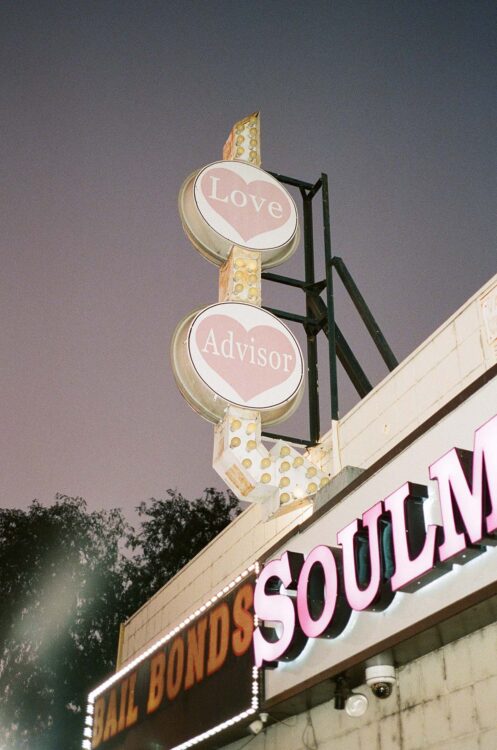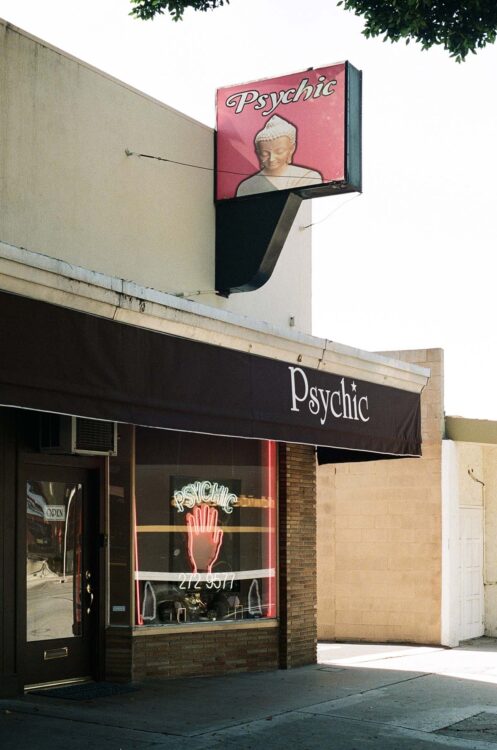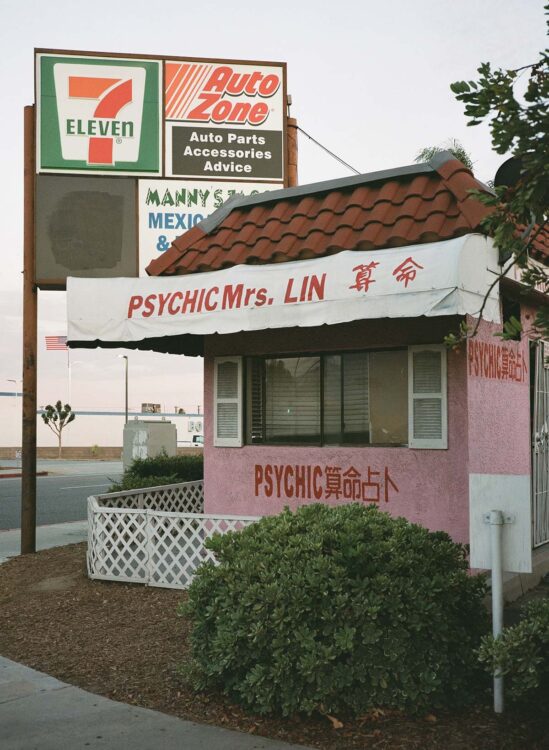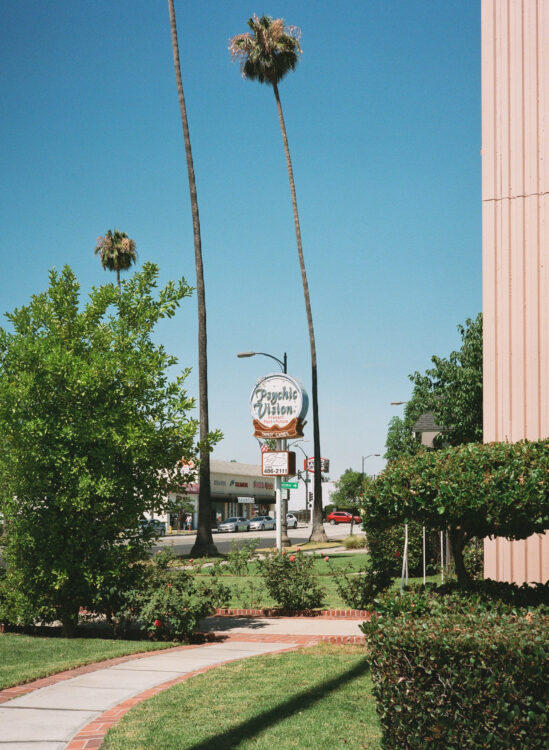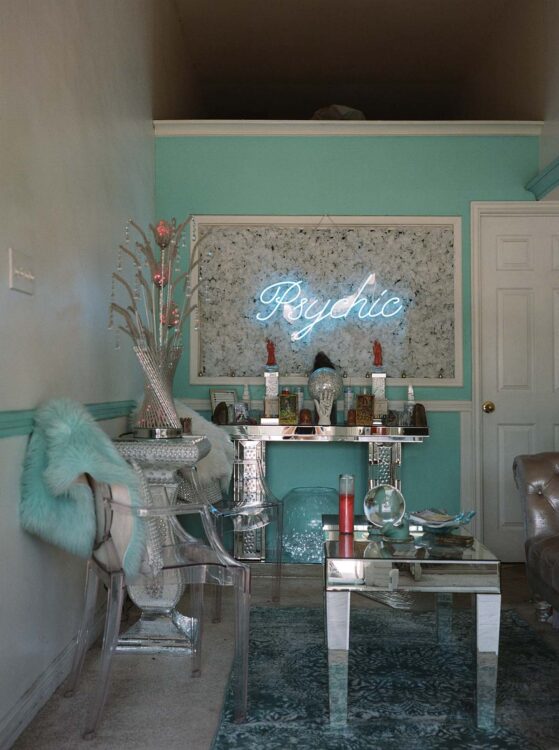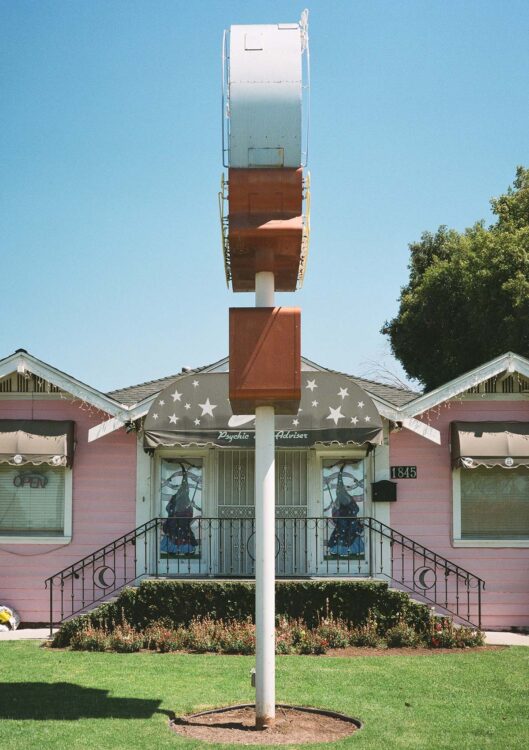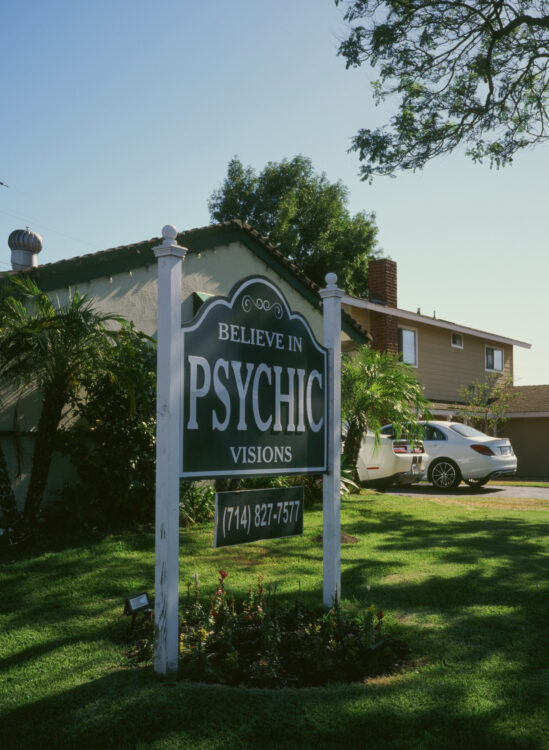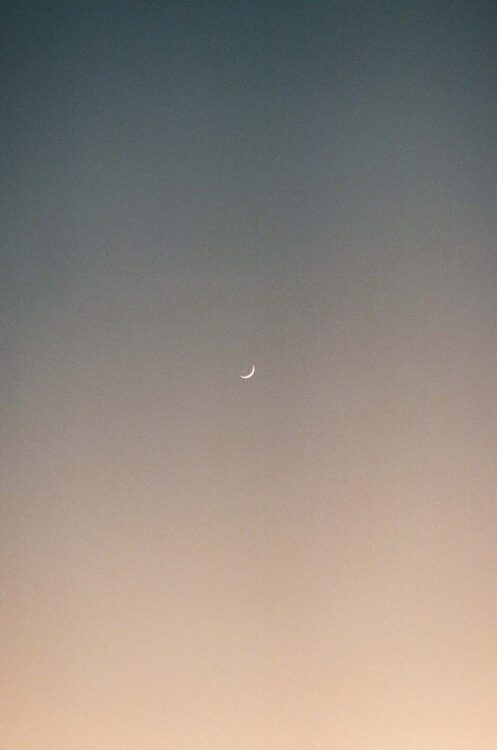LA is brimming with the commodification of belief. Old school fortune tellers and new age oracles promise the definitive revelation of destiny—if you can afford it. Cassidy George and photographer Phil Donohue take a look beyond the neon signs and beaded curtains.
On trendy La Brea Avenue in West Hollywood—sandwiched between LA’s famous hotdog shop, Pink’s, and vintage store Jet Rag—sits The Spiritual House of Crystal’s Intuition. The psychic shop is housed in a small white building with black and white striped awnings. In its windows, neon signs bear the words “Astrology” and “Alchemist” in cursive script. Outside, a red carpet lined with velvet ropes beckons customers from the dirty pavement into a small room.
Inside, an oversized baroque chair is stationed behind a desk littered with spiritual knick-knacks—a pentagram-carved pyramid candle, a crystal ball, and every colour of quartz imaginable—tools which presumably aid in healing, or add ambiance. Here, the psychic menu includes an “Aura Cleansing” session for $325, a “Commitment and Love Binding” session for $575, or a 21-day-long “Love Reunity Program” for $1175. Its signage reads: “Welcome to the spiritual house of famous spiritualists, where expert mediums answer your pressing questions.”
When photographer Phil Donohue spent 10 days this July visiting over 30 psychic shops in Los Angeles, The Spiritual House of Crystal’s Intuition was the only location that had a customer present.
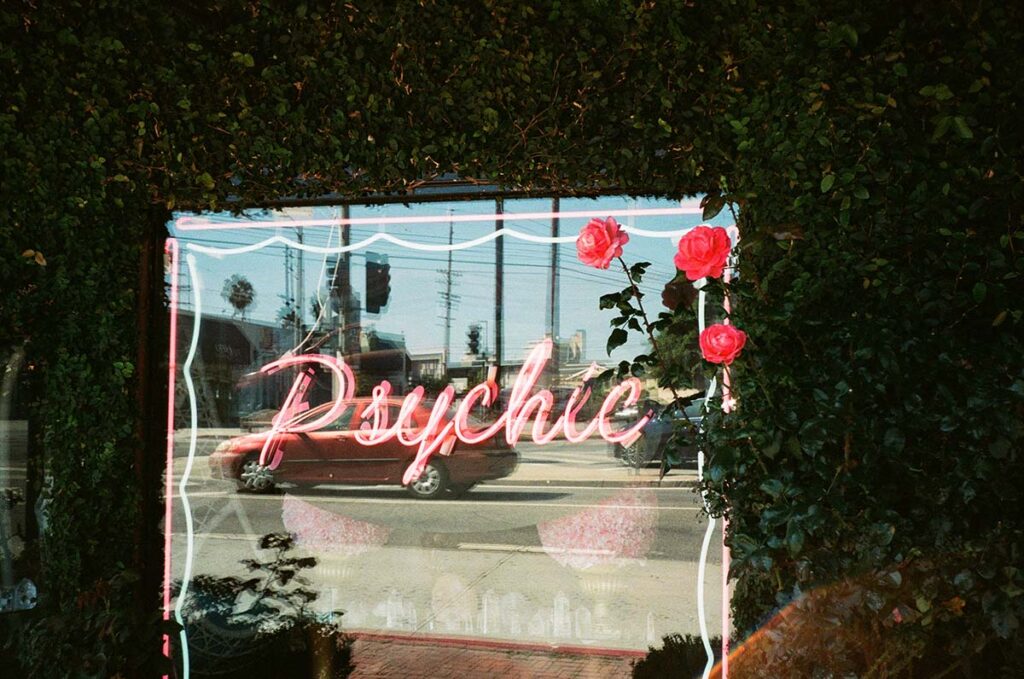
LA, America’s capital of all things new age and occult, is the urban epitome of manifest destiny. It teems with the mythological pull of the Wild West, and of the bountiful (religious) freedom and resources (like oil and gold) that white pioneers seeking new beginnings felt divinely entitled to. LA has maintained a reputation as a land of opportunity in the American psyche, an Eden-like place where fresh and “far out” ideas can flourish, far away from the Old Money traditions and Puritanical roots of the East Coast—the seat of the federal government. In the 20th century, LA, “the city of angels,” became the city of dreamers as the home of Hollywood pictures and productions: the industry that has manufactured both the modern image of America and the celebrities that define it.
The city is humming with actors, writers, producers, directors and musicians desperate for their “big break,” a hunger which has been exploited by various spiritual organisations and cults, most famously the Church of Scientology, which claims to have facilitated the success of Blockbuster stars such as Tom Cruise, John Travolta and Elisabeth Moss. Many of those who feel destined for fame and fortune (arguably a fringe belief system of its own) look to the stars for answers in their own pursuit of stardom, seeking guidance in astrology, palmistry, witchcraft and the many other practices facilitated by the city’s psychics, healers, readers, clairvoyants and mediums. As a hub for mass media and an engine in the business of belief, LA has become the perfectly situated home of countless celebrity psychics over the years, including the ‘90s TV icon and proclaimed Jamaican shaman, Miss Cleo, Gen Z’s favourite medium, Tyler Henry, and countless figures in between.
Signs for psychics and palm readers are to California what signs for guns and ammo are to Louisiana: neon promotions aglow which—despite not being the most common form of advertisement in the urban landscape—seem to culturally define it more than any other.
Driving through the sprawling city, you’re bound to encounter retro psychic signage with faded pastel hues or blown out lights. These prop-like advertisements often promote businesses that shuttered their doors long ago. Others exist in a curious state of limbo, now serving exclusively as the residences of mystics in (potentially forced) retirement. Forgotten, decaying and deteriorating properties are scattered throughout the city like skeletons and tombstones, often hiding in bizarre locations that you have to see to believe.
Soulmate Psychic is nestled between one sign for BAIL BONDS and another for WYNER TV SERVICE, and sits almost directly underneath the harrowing Ventura Freeway. Mrs. Lin’s Psychic, a 12×12 foot bubblegum pink structure in a 7-11 parking lot, is home only to an array of clutter and a collection of to-go sauces from a nearby fast-food restaurant. These are just two of the psychic shops in Los Angeles which are open for business according to the internet, but upon closer inspection, are clearly defunct.
Calling the old-school psychic shops that are apparently still in operation typically summons either a busy tone or a busy psychic. Some have been in business long enough to rack up years worth of bad Yelp reviews, making their survival feel all the more miraculous. One such location is Ruth Garfield Psychic Connection, a residence and parlour painted carnation pink and decorated with a stained glass window rendering of the psychic herself. “What can I do for you?,” Mrs. Garfield asked in a tone far less friendly than her words, following three unanswered calls the day prior. When asked if she had time to answer a few questions about her business, she yelled, “Call back on Monday! I’m doing a reading! I’m very busy!” I asked her why she had answered the phone in the middle of a psychic reading, and she briskly cut the line.
Ruth Garfield’s website is home to a promotional video recorded in front of a green screen superimposed with “cosmic” graphics. “I help people open their life, their road,” she says. “I see people with the crystal ball, I see the cards, the hand, the candle. I have been serving the Armenian community for over 50 years. I am Ruth Garfield, the original.” A basic search for her business online brings up enraged reviews punctuated by words like “FRAUD!!!” and “scam!” Multiple users claimed that Garfield told them they had “a lock on them that does not allow them to achieve anything, and that needs to be opened ASAP.” Garfield can remove it, she told them, for a price of $800.
“LA’s very territorial,” says Samantha, the soft-spoken reader who now works at Psychic Spiritual Temple in Sierra Vista, a location that belonged to her aunt before she inherited it. This “temple,” like many others in LA, is a family business—a matriarchal one. “My mom read for Gwen Stefani before Gwen Stefani was Gwen Stefani.” But celebrity clientele are few and far between. The majority of people who come in for readings at their location on Huntington Avenue these days are tourists.
I asked Samantha whether she ever considered pursuing a different path to the business of alternative spirituality. “This is what I was raised with and this is what I was taught,” she replied defensively. “It doesn’t make sense to work in fast food or do anything different. This is what works for me.” When asked about the many desolate psychic shops looming throughout town, Samantha explained the pandemic took its toll. “Clientele dropped because of inflation and other things. I think we’re the least prioritised.” But an existential crisis of global proportions also has its benefits for those engaged in the commerce of faith. “It made a lot of people question themselves and their spirituality. They’re changing their paths and looking for different ways to heal. I’ve had lots of clients come to me and say, ‘This is much cheaper than therapy!’”
The practice of “fortune-telling” has had a shifting history of legality in Los Angeles that has racially discriminatory undertones, given that the vast majority of those reading fortunes in LA in the 20th century were members of the city’s Romani community, who have been persecuted and relentlessly profiled as criminals for centuries. Fortune-telling was illegal unless facilitated under the umbrella of “an established religion” until the year 1985, when a well known Wiccan by the name of Z. Budapest—who was prosecuted for offering a palm reading to an undercover cop at her shop in Venice—won her case in California’s Supreme Court (on a First Amendment argument). While the decision allowed fortune-tellers to work outside of explicitly religious context, an aura of illegality loomed over the trade. To this day, Los Angeles psychics have to register with the police before they can offer readings.
While the city is the home of many famous psychics, it is also home to many famous “psychic” scammers, whose mass media attention continues to perpetuate associations with criminality in the trade, in many cases unfairly. In 2002, the call-service network that Miss Cleo ad vertised on her TV segments in the ‘90s was prosecuted by the Federal Trade Commission for fraud after making over one billion dollars with deceptive tricks.
Earlier this year, the LA County District Attorney released a warning about a blessing scam that targeted many senior citizens and immigrant communities. Victims were urged to put all of their valuables and cash into a bag for two days and leave it in a special location to receive a blessing, only to find the bag gone upon their return. One victim reports losing over $70,000 worth of cash and jewellery.
Recently, even psychics themselves have been targeted. Aja Daashuur, a Black LA medium who regularly speaks about the intersection of race and new age spirituality, is one of many psychics who have been impersonated by scammers on Instagram, who create mirror accounts, pretend to be psychics and then solicit money from their followers. She told the LA Times last year: “Historically people who work in wellness and spirituality have been ridiculed as hustlers and scammers… We have great integrity with what we do, but we’re an easy mark.”
The oldest surviving Tarot deck, which was created for the Duke of Milan’s family around 1440, was used among nobles for playing a game similar to bridge, known as tarocchi. But the business of tarot in LA today, psychic Jusstine Kaye assured me five times throughout our 40 minute discussion, “is not a game.” Also known under her moniker Psychicgirl, Kaye has been working as a reader and clairvoyant in West Hollywood for over 30 years. Though she offers similar services to those in other brick and mortar shops around LA, the Goop-approved medium is quick to distance herself from them. “Any time you see a neon sign, that’s an example of someone who has developed their psychic abilities, but who is not using them to help you find your greater path. They’re using them to clean out your bank account, manipulate and scare you. It makes sense, though. Why wouldn’t they go where all of the money and power is?” Now, Kaye does readings from a tented porch structure in front of her house, at a location that she only discloses to clients who have been vetted, based on the submission of a photograph of themselves and a short description of what they need guidance in.
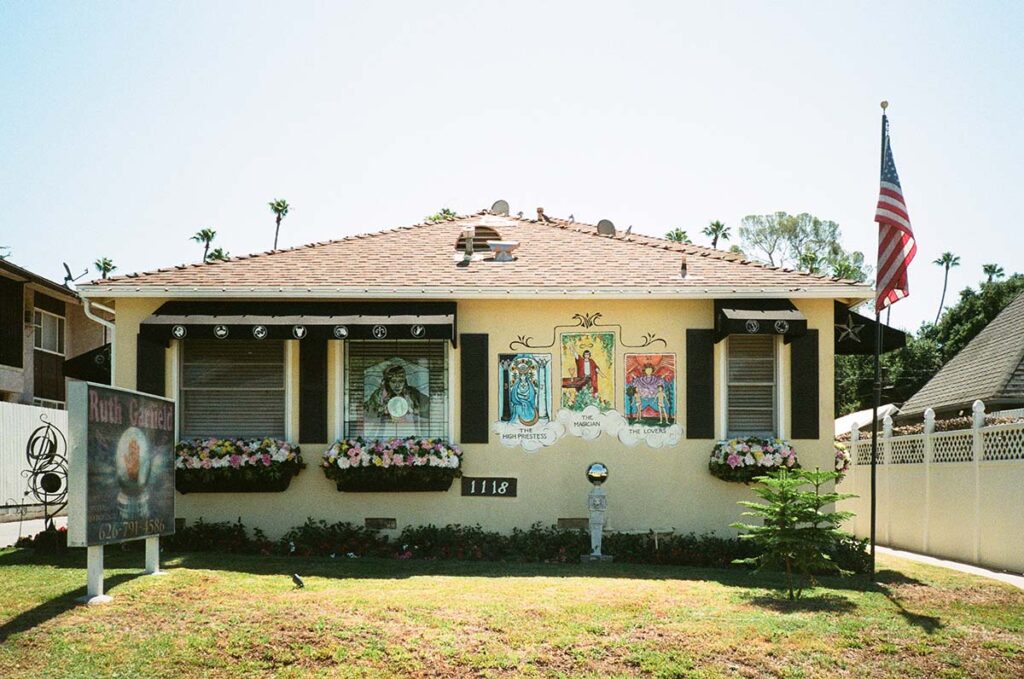
With readings offered at $475 an hour, she knowingly categorises herself as a “high ticket item” and prides herself on never having advertised. One of her services is something called the “Protection Program,” which she describes as “a 24/7 broadcast of frequencies that help you not be so negatively affected by the energy of other people.”
The medium said she feels that people who come to Los Angeles in search of stardom or success are ripe for exploitation. “LA is the Mecca of trying to ‘make it.’ Some people will do anything, and there are people who prey on that.” She relayed harrowing tales of threats and turf wars from other psychics in her area, fluctuating between grave tales and jubilant anecdotes about her past workshops at Soho House and her upcoming reality TV show. When asked if LA’s heightened “consciousness” and demand for psychics makes the competition steep, she said: “In Los Angeles, not only do you have to be the absolute best at what you’re doing—you also have to figure out how to get everyone’s attention.”
The spiritual business in Los Angeles is a goldmine. In the past decade, as the culture of self-care and wellness infiltrated popular culture, it became clearer and clearer just how lucrative—and unending—that mine is. 40% of Americans believe in psychics and another 40% believe that inanimate objects like mountains and trees are imbued with spiritual energy, according to a 2017 study on new age beliefs conducted by Pew Research Center. They also reported that 33% of Americans believe in reincarnation, 29% believe in astrology, and 60% say they hold at least one of these new age beliefs.
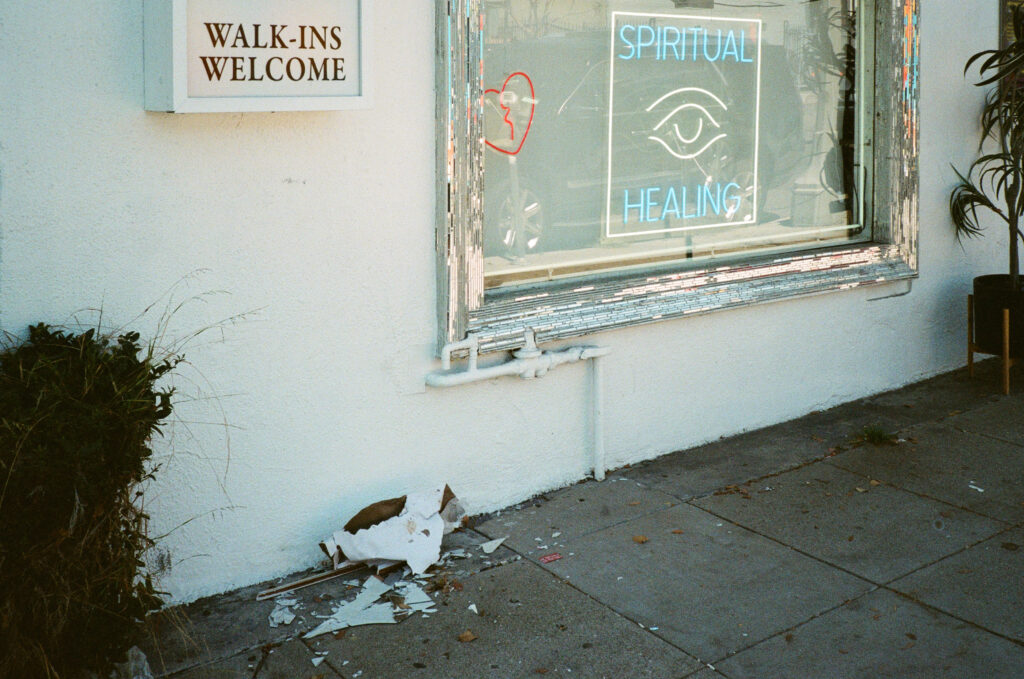
While the forlorn psychic shops around the city seemingly herald a dying industry, psychics, mediums, readers, clairvoyants and witches have not gone out of style. Rather, social media, millennials and rising rent prices have ushered in the reign of psychics with a different style: the kind without brick and mortar. For those whose professional efforts are allocated predominantly online, rather than behind a neon sign, business is booming.
“There’s a joke in our community that you can’t throw a crystal without hitting a witch in Los Angeles,” said Amanda Yates Garcia. “But most of the witches that I know here have a thriving business.” Garcia, who is better known as the Oracle of Los Angeles, falls under the category of “spiritual celebrity.”
The CalArts graduate and PhD candidate spends her days planning New Moon ceremonies, counselling clients and working on her popular podcast, Between Two Worlds. She attributes much of her success as a full time healer to the various skills she was able to hone in graduate school, including copywriting, filmmaking and coding, and her dexterity with design programs.
“Some people think of psychic work as someone sitting in a parlour behind a beaded curtain, watching soaps and smoking cigarettes, who reads your palm and tells you what’s going to happen to you in six months or a year. That’s not what I do and that’s not what most of my colleagues do,” said Garcia. “The people I know that are successful in this business are artists that have a lot of talents besides the ones they use as healers. They’re like media empires.”
As a new-school representative of new age beliefs, the Oracle’s work feels far more akin to therapy than it does a mystical party trick. The media she painstakingly generates is simply the medium for her message, which she hopes will touch the lives of people well beyond her LA zip code. “We’re looking to find ways to communicate with the parts of you that haven’t been indoctrinated by the powers of capitalism, colonialism or consumerism, and to help you find a clarity and a sense of intuition about who you are and where you want to go, so you’re no longer bogged down by all of the anxieties, pressures, judgments and traumas of our culture.”
While visiting an old-school psychic often carries a thrill similar to getting a spontaneous piercing, the Oracle of Los Angeles’ ambition is not to entertain, but to engage a community of people who find refuge in alternative systems of support. “Our institutions are not designed to help us, they’re designed to exploit us and extract from us. The Constitution and the structure of this government was created by genocidal white men who didn’t want to pay taxes on the wealth they amassed through enslavement and the theft of other people’s lands. How can we rely on their systems to help us?”
Though Garcia offers a wide variety of sessions and works with many “modalities”—alchemical divinations, coaching, astrology, rituals, spells and ceremonies—at the core of each of her sessions and group workshops is a quest to help her clientele “find their own power and recognise their agency.”
When asked why she thinks people turn to psychics and mediums for help, she cited inclusivity, adding that witchcraft and other adjacent practices have traditionally been a welcoming space for LGBTQ, indigenous and femme-identifying communities who reject (or feel rejected by) organised religions. “These are decentralised practices. They’re anarchic. There’s no Pope or Bishop. There’s no head guy. There’s no central text saying, ‘This is how you do this, and this is the only way to do this, and if you don’t do this, then you’re wrong.’ These systems are community based.” In a country plagued by mass shootings, battling ecological disaster, and mourning the loss of fundamental rights to things like abortion, practices that facilitate connection and collectivity, Garcia says, are in great demand.
Another celebrity psychic who lacks an IRL parlour but who has certainly managed to get Los Angeles’ attention is Sarah Potter, who is perhaps best known for her astrology column for Cosmopolitan. Potter thinks that an increasing affinity for occult practices is one of the defining traits of our times. “Another spiritual awaken- ing has cracked us open again. It’s similar to what we saw in the ‘70s and ‘90s,” she said. “Given everything that’s happened, how can you not question what’s next?”
Potter, who splits her time between New York and Los Angeles, is frequently offered gigs by major corporations, including hedge funds, which have brought her in to do readings on more than one occasion—a new psychic reality that, perhaps even ten years ago, would have seemed outlandish. Despite measurable moves toward greater social acceptance, Potter says being a full time psychic still carries tremendous taboo. “There’s been a lot of growth, but there’s still a lot of fear around this work. I think people are afraid of a woman owning her power and having confidence. They think, ‘what can [she] see that I can’t see?’”
America’s psychic city is in a state of transition. As the neon lights of LA’s brick and mortar psychic shops flutter out, its new vanguard of tech-savvy readers are drawing new clientele in, indulging their cosmic curiosities with digital-first strategies that have global implications. The foundations of the industry, however, are constant: the deep yearning for answers, the desire to trust in the knowledge of others, and the belief in magic in its many forms.
As the tail of her black cat, Poly Styrene, wiggled in and out of the FaceTime frame, Potter paraphrased hate mail containing death threats and described harrowing pamphlets she finds in her mail, which say that she will burn in hell. “I just want people to feel magical and connected! Life is so much better when we recognise the signs of the universe and the magic within and around us.”
If the essence of psychic work in LA, both the kind done behind a beaded curtain and on iPhone screens, is the act of holding up a mirror to someone else, it seems the thing Californians are most afraid of—or endlessly fascinated by—is not the mystic, but their own self reflection.

